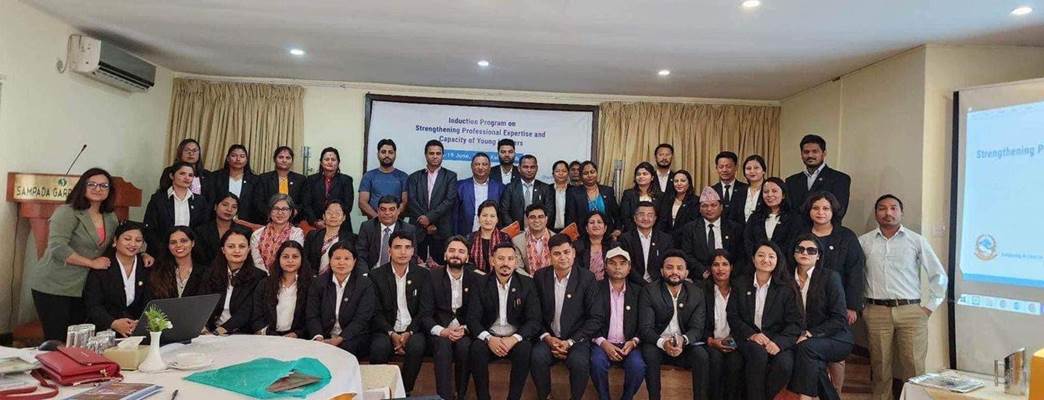The Government of Norway and United Nations Development Programme in Nepal (UNDP Nepal) have maintained a longstanding partnership with the Government of Nepal in key areas such as access to justice, rule of law, governance, and human rights. Through collaboration with Ministry of Law, Justice and Parliamentary Affairs and support from Norway, the Enhancing Access to Justice through Institutional Reform Project (A2J Project) has made significant strides in advancing access to justice of women and marginalized communities. This has been achieved through enhancing the capacity of justice sector institutions and empowerment of women and marginalized communities. Notably, there has been visible impacts on the representation of women and development of gender-responsive justice system.
At present, approximately there are 11% of women judges (44 women out of 402 judges) in all three layers of the court system in Nepal. Specifically, there are three judges in the Supreme Court, 23 in High Court and 18 judges in District Court. This marks a notable increase from 2015 when the representation of women judges was less than 3%, with only eight women among 338 judges.
In achieving the progress, A2J project has made significant contribution across law, policy and operational level. At the political and policy level of justice sector, the National Judicial Academy (NJA) was supported to formulate a “Gender Equality and Social Inclusion (GESI) Strategy”. As an autonomous body, the judicial academy has been conducting training, studies/ research required for the judges, government attorneys, government legal officers, judicial officers, private law practitioners, and others who are directly involved in the administration of justice in Nepal. The strategy was formulated in close partnership with UN Women with an objective to enhance gender equality and social inclusion ensuring adequate representation and participation of women and target groups in the judiciary and judicial service.
The technical expertise was offered by UNDP to the Nepal Bar Association, an umbrella institution of lawyers in Nepal to develop a Gender and Professional Safety Policy with an objective to advance safer and more inclusive legal environment in Nepal.
To enhance meaningful representation of women in the justice sectors, A2J project has been adopting a comprehensive approach that includes affirmative law education, policy reform and empowerment. Under the affirmative law education programme, the Project has been implementing scholarship scheme, community law education (CLE), internship/externship and capacity building of women and lawyers from marginalized communities. Together with universities at federal and province level and with Nepal Bar Association, the project has provided scholarship to 20 law students (12 women and eight men) for the five years bachelor level study, internship/externship to 300 new lawyers (195 women) and total of 508 (270 women). There are nine scholarship grantees and eight interns joined civil service. As mentioned above, all these initiatives are intended to prepare women and lawyers from marginalized communities for their representation in justice sector and their contribution towards gender responsive justice system.
Regarding the gender responsive justice system in Nepal, the project has played crucial role in developing and implementing several policies. These policies include Special Operating Procedure (SOP), In-camera hearing to ensure privacy and confidentiality on SGBV cases, continuous hearing to expedite the SGBV cases in a speedy manner, GESI Strategy for the Judiciary, code of conduct for judges, lawyers and prosecutors that encourage gender friendly atmosphere at workplace and gender friendly operations. The projects piloted initiatives namely in-camera hearing, continues hearing of the cases, separate family bench, integrated legal services in few districts which are gradually being institutionalized at policy and practice level.
Additionally, the project has conducted studies and assessment conducted on perception of women and marginalized communities towards the justice system, overall situation of access to justice of same ones and behavioural aspects of witchcraft system in Nepal. The studies have been contributing to initiate discourse towards equitable and responsive justice system.
The devolution of judicial power to the local level (Judicial Committee) represents a significant policy shift, despite the critics on its political nature and capacity gaps. The project reached out to above 187 Judicial Committees with 693 women among 1819 members to enhance their capacity on delivering their justice related mandates. Further, legislative drafting manual for provincial and local level is standardized and implemented to make gender responsive legislative drafting process.
As a result of standard law drafting manual, Judicial Committee training manual (GESI and Human rights Based Approach integrated in both manual) and trainings to local government officials, some local governments have started to address GESI issues through policy reform.
Lastly, there is still more to consider in a long run. The justice sector remains inadequately representative and inclusive. The constitution envisages proportional representation in all wings of the government. It is important to foster support and partnership to build the capacity and continue lobby and advocacy efforts.

